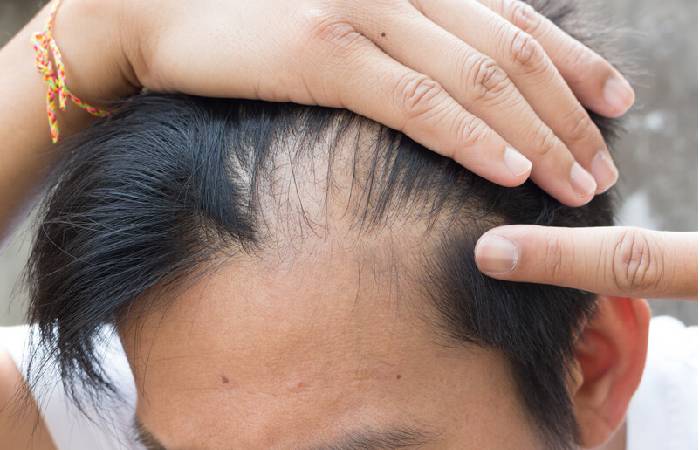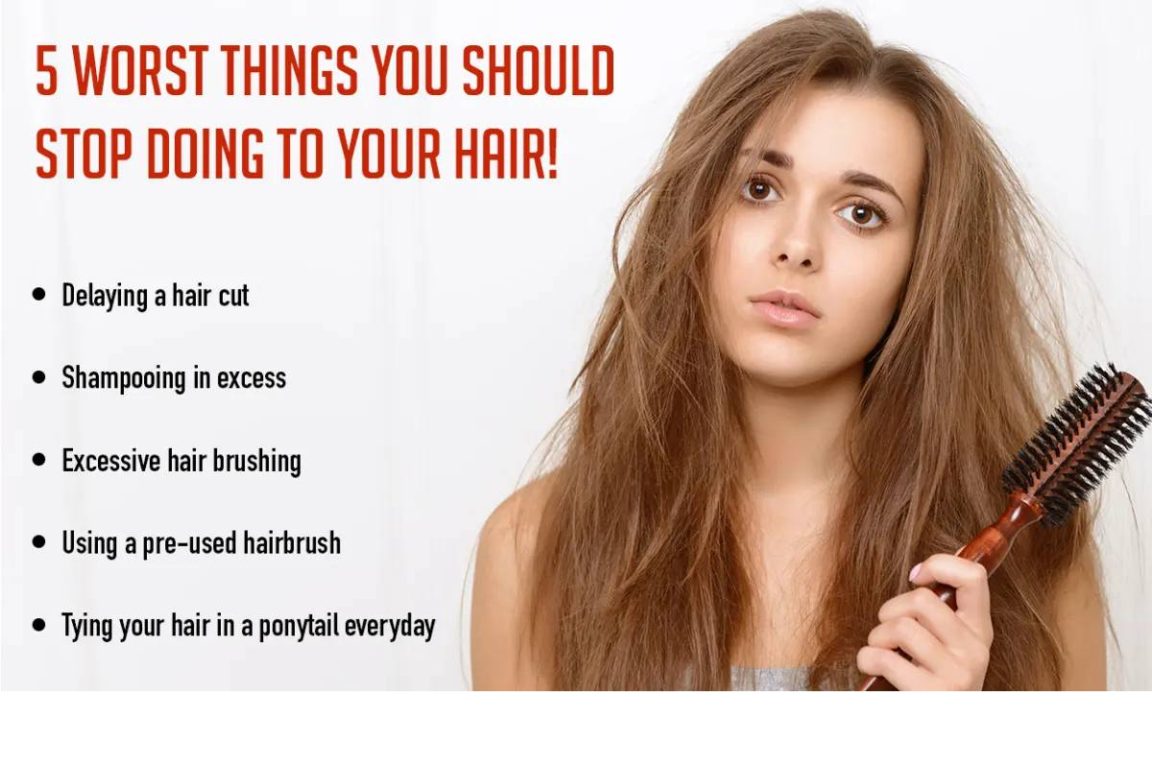Hair Loss in Teenagers – Everyone from adults to teenagers faces the problem of hair loss. It is a common problem nowadays. Hair loss is not considered standard in teenagers as the vitality of hair growth is supposed to be relatively stable during this age. However, various external conditions and underlying medical conditions are the reasons for the possibility of a teenager experiencing hair fall.
Hair loss occurs for specific reasons, such as increased shedding or breakage; certain factors stop hair growth. You can consult a dermatologist if you find a rise in shedding or breakage. A dermatologist can find the root cause of it and can suggest the proper treatment for it.
Hair Loss in Adolescent Boys

When it comes to hair loss, we often envision older men. However, young men are also more likely to experience hair loss. If you have noticed that you are losing excess hair, this may indicate underlying health.
Some of the leading causes of hair loss in young men include:
Malnutrition
Malnutrition is one of the leading causes of youthful hair loss, as hair follicles become weak due to an improper diet.
Roundworm of the Scalp
It is a fungal infection of the scalp, also called tinea capitis, resulting in patchy hair loss if not treated promptly.
Alopecia areata:
There are cases where teenagers can suffer from alopecia areata, which causes patchy and rapid hair loss. About 20% of people diagnosed are under 16 years of age.
Medical conditions:
diabetes, thyroid, lupus, etc., are some medical conditions that can result in hair loss. But, these medical conditions are not usual in adolescents.
Trichotillomania is a rare psychological condition in which people must pull out their hair. As a result, bald patches begin to develop on the scalp. This condition is more common in girls than in boys, although there are cases.
Traction Alopecia – This condition causes hair loss when the hair is pulled in a particular direction for too long. Always keeping your hair in a tight ponytail is such a case.
Androgenetic Alopecia: Also known as male-design baldness, this condition causes gradual and permanent hair loss on the scalp. For some, this can start during adolescence. However, it is not a usual reason, occurring in only 16% of children in the 15-17 age group.
Drugs/Medications – Anticancer drugs, vitamin A derivatives, antihyperlipidemic medicines, antiepileptic drugs, etc. However, these diseases are not common among young men.
Hairstyles and products: Using hair styling products can lead to hair loss as they contain harsh chemicals.
Stress: Any physical or emotional stress can trigger hair loss.
Dandruff: In some cases, dandruff can aggravate hair loss. Sometimes infections with dandruff also occur, which can increase hair loss.
Common Causes of Hair Loss in Adolescents
Here are some reasons for hair loss in young women; for example:
Hormonal imbalance: During puberty, hormones trigger significant changes in the body, and some teens may even suffer from hair loss.
Drugs/medications: oral retinoids for acne, withdrawal of oral contraceptives, etc. Medicines like can cause hair loss.
Excessive combing: hairstyles that put too much pressure on the strands cause hair loss. Chemicals like paraphenylenediamine (PPD) or ammonia found in hair dyes hurt hair. They can cause allergic scalp dermatitis, leading to hair loss.
Malnutrition: A nutritional diet deficiency also affects your hair’s strength. Eating a healthy diet with all the adequate nutrients is essential for health and well-being, preventing hair loss.
Natural conditions – Pollution, overexposure to the sun, lack of sufficient humidity in extreme seasons, etc. It can also contribute to hair loss in girls.
Early Signs of Hair Loss in Adolescents
Detecting the problem of hair loss in the early stages will increase the chances of its resolution. Here are some of the early indications and symptoms of teenage hair loss:
Receding hairline (men): A receding hairline is a condition where you lose hair in the temple area. It is also known as widow’s peak.
Crown Thinning (Women): Hair thinning in women begins at the crown of the head. It may not be very noticeable at first, but nearer inspection will tell that your scalp is most visible in the crown area.
Itchy and flaky scalp: Itchy and crumbly scalp and hair loss are not directly related. However, conditions like dandruff and seborrheic dermatitis can cause hair loss.
Satisfactory Hair Growth – In the initial stages of hair loss, you will observe some hair growth after the initial shedding. However, this new hair growth will gradually get shorter and much finer and thinner.
Treatments for Hair Loss in Adolescents
Age plays a vital role in teen hair loss solutions and treatments, as not all treatments suit teens. Teens suffering from hair loss may be prescribed medications, procedural therapies, or a combination.
Listed below are some effective treatments that can help solve the problem of teenage hair loss.
PRP: Platelet Rich Plasma
It is a non-invasive and therapeutic natural hair growth and restoration treatment. It is known as one of the safest and most active treatments available for several types of hair loss. A blood sample is collected and processed by a centrifuge. This centrifugation process separates the platelets from the plasma and enhances them with Protein-Rich Growth Factors. This rich mixture is reinjected into the scalp (using tiny needles) with insufficient hair growth to stimulate dormant stem cells. It promotes the development and restoration of natural hair for youth. The minimum age necessary for this treatment is 18 years.
Minoxidil
It is a USFDA-approved medication that treats hair loss in males and females and is recognized to raise hair growth. It is available in liquid or foam form and has specific side effects such as scalp irritation and unnecessary hair growth (if it comes in contact with other areas), so we must consider these instructions. Young boys and girls can equally use this medicine.
Finasteride
It is a US FDA-approved drug that helps slow down hair loss in men. We must consider dosage and instructions for use, as it has side effects when we misuse it. Women cannot use this medicine, regardless of their age. It is also appropriate for men over the age of 18.
Oral Contraceptives: Birth control pills are sometimes specified to help treat a hair loss condition associated with a hormonal imbalance while treating existing acne.
Low-Level Laser Therapy: The US FDA has approved LLLT for men and women with hereditary hair loss. It can increase hair density but may not have a long-term effect as no objective evidence supports it.
Prevention (General Advice)
The preventive measures listed below can help you prevent and cope with your teenage hair loss complications:
- Washing your hair regularly with mild shampoo to keep your scalp clean.
- Do not brush your hair instantly after washing, as damp hair is more prone to breakage.
- Practice hair products suitable for your skin and hair type, and seek the advice of your dermatologist if in doubt.
- Enhance your diet with more protein and fresh vegetables.
- Stay hydrated and maintain hygiene.
- Check your exercise equipment and wear more airy clothing to control excess sweat. Shower immediately after training to prevent sweat buildup.
- Keep stress at bay and stick to a proper exercise routine with 8 hours of sound sleep every night to avoid stress.
- Monitor your medications and get health screenings to detect any medicines that may cause hair loss. Discuss an alternative with your doctor.
- Do not use excessive pressure when combing, drying or styling your hair.
- Avoid using blow dryers, flat irons, and hair dyes, as heat can damage your hair.
Hair Loss in Teenagers – Conclusion
Hair Loss in Teenagers – Hair loss is a common worry for people of all ages, even teens. With fast-paced lives, pollution, and inevitable exposure to the sun’s UV rays, we tend to overdo our hair care routine. Managing your diet, fitness, hygiene, and health can help treat and stop hair loss. Be sure to visit your skin doctor when you see the warning signs and avoid permanent damage to your hair.

